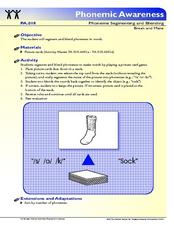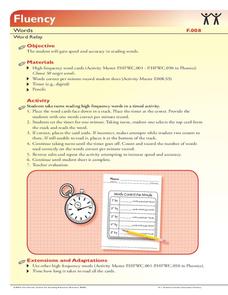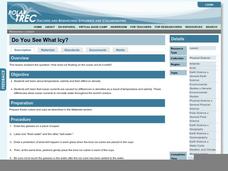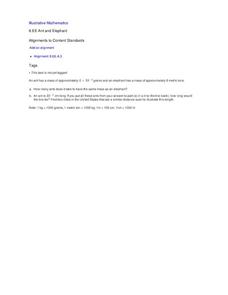Curated OER
Cartoons for the Classroom: Prorogue in Canada
Canada's financial woes and a controversially suspended Parliament create fodder for political cartoons in this critical analysis handout. Background information clarifies the context, allowing scholars access to the cartoons, which poke...
Curated OER
World of the Pond
Field trip! The class will review what they know about organisms that dwell in freshwater ponds, then trek down to the old water hole to collect specimens for examination. This includes several web links, useful tips, and an excellent...
K12 Reader
Location, Location, Location
Why do some places in the world have more people living there than other places? Learn about the ways the countries have formed around natural resources with a reading comprehension activity. After kids read a short...
K12 Reader
World Climates
Why is weather different around the world? Learn about world climates with a reading comprehension passage. Kids read a short passage before answering five comprehension questions based on context clues.
Curated OER
Capital Letters: Q-X
This old fashioned handwriting activity will help your printing pupils master capital letters Q-X. They examine example letters with numbered arrows, then practice by tracing. Finally, students test their new skills by printing...
Florida Center for Reading Research
Phonics: Letter Recognition, Lettercritter
This is a fun idea to get your scholars practicing their ABCs! They assemble an alphabet caterpillar, printing lowercase versions below each uppercase letter. They practice writing the lowercase letters using dry-erase markers and say...
Florida Center for Reading Research
Phonics: Letter-Sound Correspondence, Letter-Sound Pyramid
This fun game is a way to help your littlest learners build strong phonological awareness. Scholars equipped with letter triangles, a stack of picture cards, and counters choose a picture card, say the name of the image, and attempt to...
Florida Center for Reading Research
Phonological Awareness: Phoneme Isolating, Final Phoneme Find
This phonics activity engages listening skills and concentration. Young scholars listen to a teacher-made recording and use the provided worksheet to number the final phonemes they hear.
Florida Center for Reading Research
Phonemic Awareness: Phoneme Segmenting, The Phoneme Game
Early readers play a board game to practice segmenting phonemes. Players determine how many spaces to move by choosing a picture, saying the object's name on the card, then counting the phonemes they say.
Florida Center for Reading Research
Phonemic Awareness: Phoneme Segmenting and Blending, Break and Make
Young learners build phonemic awareness and strong phoneme blending skills. Pairs guess the image on the card based on the word segment sounds given by blending what they hear.
Florida Center for Reading Research
Drop and Say
This neat idea gets kids to use phonics and puzzle-solving skills. Pairs take turns picking picture cards from a pile, say the name of the object on the card, drop a letter to turn that word into a new word, then look for the new word on...
Florida Center for Reading Research
Fluency: Words, Word Relay
Peers take turns timing each other for one minute and reading as many high-frequency cards as possible.
Curated OER
Prepositions Can Show Positions in Space
Answer the questions where and when with this handy prepositions worksheet. Twelve questions contain prepositional phrases for your class to find and label; the first one is completed as an example. The resource includes an answer key on...
Curated OER
Find the Rhyme
Which one rhymes? There are four starting objects here, each heading a row of three objects. Learners identify the objects and their vowel sounds to determine which one rhymes with the first object. All these rhyming words involve the...
Curated OER
Fractions
What fraction is represented by these shapes? Scholars examine fraction models as they apply basic fraction skills. The first two problems are guided; they look at a set of shapes with some shaded, circling (from three options) the...
Curated OER
Subtracting Bigger Numbers: 2 and 3-Digit Numbers
Subtraction problems are simple - or are they? Fourth graders subtract 2-digit numbers from 3-digit numbers in different formats, including vertical problems, horizontal problems, and word problems. Use this resource at the end of your...
Curated OER
Human Parts
Very young learners who are studying the human body will use this worksheet to identify certain body parts. A cartoon drawing of a boy is shown, and learners must draw lines matching up words such as arm, tummy, foot, and toes to the...
Worksheet Web
Learning about Volcanoes
There's something about the classic volcano demonstration that can grab any learners' attention. Scholars begin with a reading and grand conversation about volcanoes, construct an erupting volcano using vinegar and baking soda, then...
Curated OER
Publish a Book
Help your autistic learners to create a story and publish a book. They write simple stories, then turn their stories into books. A picture is drawn for each page of the book and the story is written below. Note: This is a good activity...
California Academy of Science
Buoyancy Bulls-Eye
Why does a seastar sink, but a jellyfish float? Through a fun investigation, learners examine the concept of buoyancy using simple household items. The challenge: create neutral buoyancy for an action figure in water. With ample...
Curated OER
Plankton Parade
Plankton isn't just a tiny cartoon character, it's also a very important food source for animals around the world. Budding scientists discuss the types and functions of plankton, including where they are found, how they are caught, and...
Polar Trec
Do You See What Icy?
Here is a lesson that kicks off with a question. "How does ice floating on the ocean act as it melts?" As learners investigate this natural phenomenon, they'll discover that it has a lot to do with temperature, salinity, and the effect...
Curated OER
Ant and Elephant
Have you ever wondered how many ants make up an elephant? Inquisitive minds will be amazed as they use scientific notation to compute and compare the mass of an elephant to an ant. Have participants make guesses and see how close they...
Perkins School for the Blind
Bagging Groceries
Bagging groceries is a skill that can help learners with visual impairments understand organizing, problem solving, and weight discrimination. In addition, it is also a wonderful job skill. Help learners as they determine how to bag...























